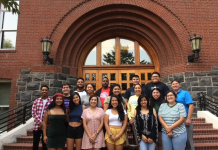
Last year, only a handful of students got As in my Advanced Placement (AP) Language and Composition class at Prospect High School.
I noticed many of my classmates complaining about these results, commenting that they felt like English isn’t supposed to be so tough.
But why? Ending up with Bs or Cs in AP Calculus or AP Chemistry is pretty typical, and I never hear my fellow students saying these courses should’ve been “easier.”
Humanities are academic subjects which consider the thoughts and culture of humans. An example of this is philosophy, which examines our values, or English, which explores a language.
Growing up in the Bay Area, I’ve seen the way my peers demean the value of History or English classes. This comes from the idea that the humanities don’t teach us “real” skills that will apply to our lives in the future.
We see this attitude reflected in the drop of humanities majors in the last few years. According to the Cornell Undergraduate Research Journal, the proportion of undergraduate students studying the humanities decreased roughly 30% from 2005 to 2020.
Some argue that artificial intelligence can fix our grammar and write essays for us, making English classes seem unnecessary. Additionally, they claim that more lucrative industries require STEM degrees. However, this isn’t the whole truth.
Humanities & Employability
I’ll often hear students at my school arguing that a degree in one of the humanities subjects isn’t the ticket to a good job.
Computer science and pre-med have clear pathways for students to follow. Students at my high school often feel like the technology industry offers job security.
However, now that I’m a senior, I’ve been spending a lot of time researching career options. And one thing I’ve learned is that there is no one “right path.”
Pallavi Dalvi is senior talent acquisition partner for Synopsys, a company that designs computer chips. She tells me there are many different ways to break into the tech world.
“We are very open to any degree,” Dalvi said. “If a person has an English degree that will maybe be more relevant to our marketing, HR or legal positions.”
Dalvi notes that recruiters will often look for people with communications studies on their resume.
In fact, strong written and verbal skills are even important for technical roles, she explained.
“We have customers, so in order to relate to them you must communicate with them,” she said.
Dalvi notes that plenty of positions at Synopsys require a range of skills, not just the sorts of things STEM classes focus on.
“Having a technical degree is not going to be the only background we look for,” she says.
Dalvi majored in psychology, which is often considered a ‘sister’ subject to the core humanities. She credits the skills she acquired during her degree as key to her success in her career
“Technology changes so quickly,” she says. “We have to be able to switch gears often.”
This goes to show there are valuable hard and soft skills you’ll gain as a humanities major.
The ‘Real’ World
My father once asked me, “Why do you need English class? You already know English.”
Here’s my answer for my Desi dad: English is about much more than vocabulary and grammar.
Erin Swart, my AP Literature and Composition teacher, explains how the subject goes far beyond that.
“Learning how to communicate is one piece, but then leaning into how literature is a form of expression is the other part of what we learn,” she tells me.
It helps provide different perspectives, fostering empathy and understanding, Swart adds.
I am seeing this in real time as my class reads A Thousand Splendid Suns by Khaled Hosseini.
The book follows two Afghan women navigating societal expectations while Afghanistan’s political state rapidly changes.
Growing up in America, I’ve always had a one-dimensional view of Afghanistan, associating the country primarily with violence and terror. This book has continually challenged me, given how it depicts the vibrance of the culture and the strength of the people who reside there.
“I find these four years to be a fascinating time in people’s lives,” Swart says. “Their eyes are being opened to things that they hadn’t considered before, particularly as it relates to literature. They come to realize they are a product of how they’ve been raised—and they sometimes start to shift their mindsets.”
And, Swart says, this transformation often continues long after students have left high school behind.
“We need people who are looking to develop these technological advances; that is important,” she says, but she adds that empathy is also important. “If we lose our ability to be compassionate, then all of the advances in the world are worth nothing, in my opinion.”









